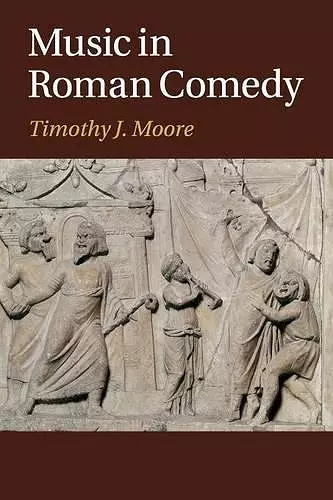Music in Roman Comedy
Format:Paperback
Publisher:Cambridge University Press
Published:15th Sep '16
Currently unavailable, and unfortunately no date known when it will be back

This book offers a new explanation of how the plays of Plautus and Terence worked as musical theatre.
This book explains the nature of Roman comedy's music and provides musical analyses of songs, scenes and whole plays. This book will be of interest to students of ancient theatre and Latin literature, scholars and students working on the history of music and theatre, and performers working with ancient plays.The plays of Plautus and Terence were profoundly musical: large portions of all the plays were sung to accompaniment, and variations in melody, rhythm and dance were essential elements in bringing both pleasure and meaning to their performance. This book explains the nature of Roman comedy's music: the accompanying tibia, the style of vocal performance, the importance of dance, characteristics of melody, the relationship between meter and rhythm, and the effects of different meters and of variations within individual verses. It provides musical analyses of songs, scenes and whole plays, and draws analogies between Roman comedy's music and the music of modern opera, film and musical theatre. The book will change our understanding of the nature of Roman comedy and will be of interest to students of ancient theatre and Latin literature, scholars and students working on the history of music and theatre, and performers working with ancient plays.
'Awesome in scope and ambition …' Greek and Roman Musical Studies
'This excellent book is essential for all serious readers of Plautus and Terence, and for anyone interested in ancient music. Scholars of Atic comedy and tragedy will also greatly benefit from its methodologies.' Timothy Power, Phoenix
'This book is well-organized and thorough. Its depth and breadth are remarkable, demonstrating equal comfort with nitty-gritty particularities of Latin elision or hiatus, with comparative evidence and supplementation of textual or evidentiary lacunae. Moore's book enhances its reading of comedy's performance conditions by drawing on Latin oratory and rhetoric, lexicography, Greek musical theory, and Roman historiography, plus a bevy of outside material including Japanese kyōgen, Broadway musicals, Western opera, Yugoslavian epic, Javanese gamelan shadow-puppet theater, and folk-music traditions of Greece, Sicily, Turkey, North Africa, and the Middle East. This breadth is matched by careful, cautious use of sources.' T. H. M. Gellar-Goad, Bryn Mawr Classical Review
ISBN: 9781107535282
Dimensions: 229mm x 152mm x 24mm
Weight: 630g
470 pages